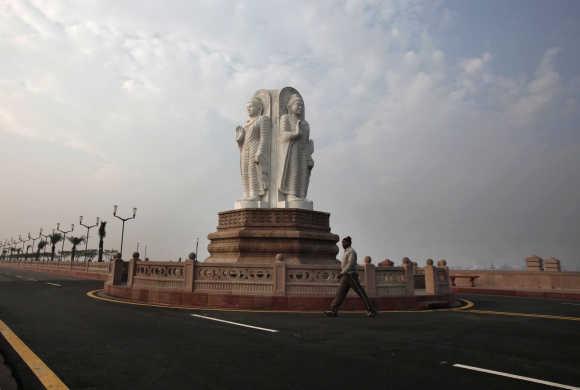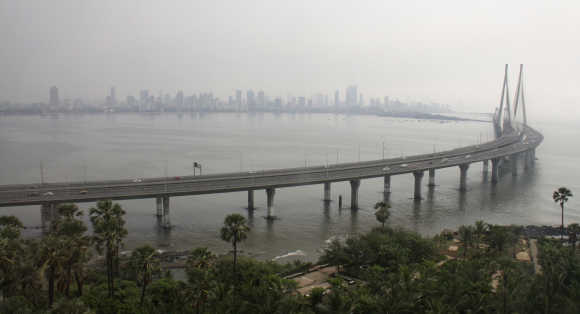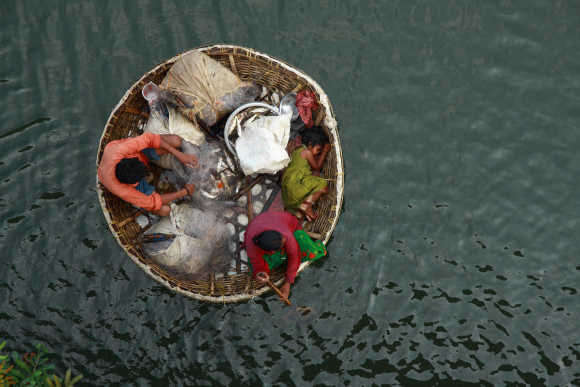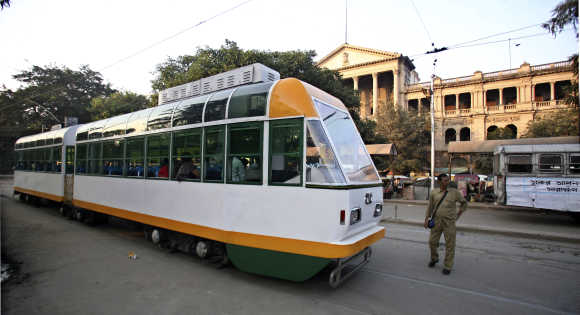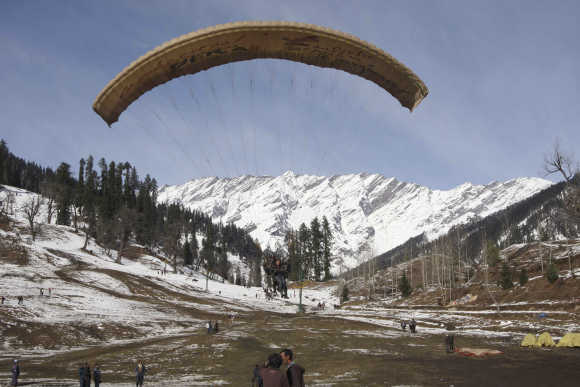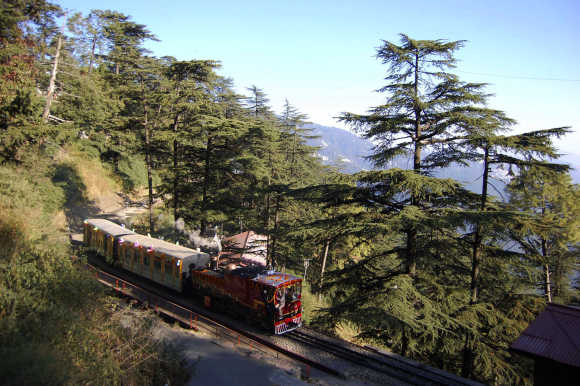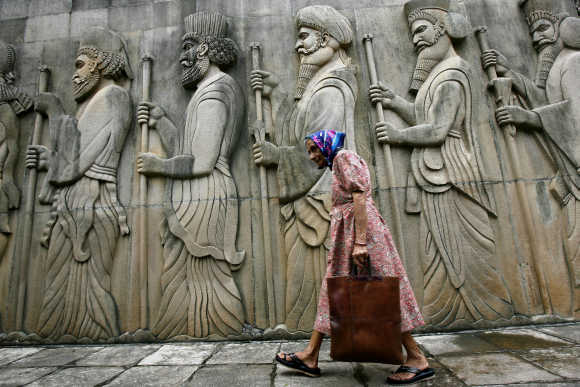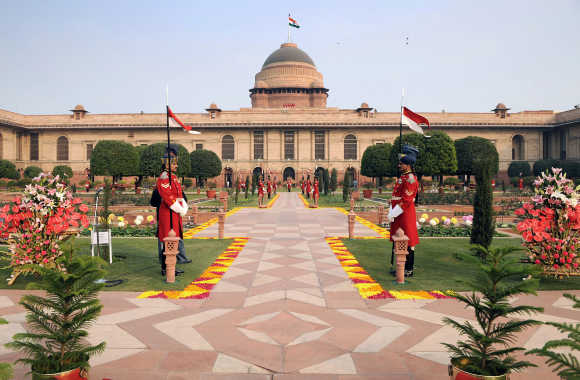 | « Back to article | Print this article |
12-step plan to boost India's economy
India's GDP growth fell to a nine-year low of 5.3 per cent in the first quarter, down from 9.2 per cent the same time last year.
With 550 million Indians under the age of 25, RV Kanoria, Federation of Indian Chambers of Commerce and Industry's President, said recently in New Delhi that India can't afford to not continue on a path of high growth that creates millions more jobs.
"We are sitting on a time bomb," he warned.
Kanoria outlined a 12-step programme that can boost India's economic recovery. Let's have a look at the plan.
Click NEXT to read more...
12-step plan to boost India's economy
1) First, the government should eschew the temptations of a premature welfare state and announce an immediate moratorium on any additional expenses on doles.
Given the present state of its finances, the country can ill afford handouts. Under Nrega, greater emphasis should be laid on focused need based asset creation such as infrastructure and wages should not exceed productivity of labour in agriculture and other rural activities.
Click NEXT to read more...
12-step plan to boost India's economy
The sums already allocated for welfare schemes should be distributed in an efficient manner as envisaged under the "direct transfer of subsidies" programme linked to the Aadhar platform.
Click NEXT to read more...
12-step plan to boost India's economy
2) Second, expedite the implementation of the Goods and Services Tax. A major landmark reform that could alter the dynamics of Indian industry and exports - making both more competitive - is the introduction of Goods and Services Tax.
The move to GST has been inordinately delayed.
Click NEXT to read more...
12-step plan to boost India's economy
This should change and GST should be introduced at the earliest. I reiterate that in a crisis situation the national polity needs to come together and the government owes it to the nation to build consensus.
Click NEXT to read more...
12-step plan to boost India's economy
3) Third, ease the monetary policy and bring down interest rates by 200 bps and CRR by 100 bps. It is acknowledged that inflation in India is largely a supply side problem.
To deal with such a problem using monetary tools may not be the right approach. Rather, at a time when more supplies - both for agri-commodites and industrial raw materials - are needed, a high interest rate environment, by disincentivising investments and hence greater supplies, may actually worsen the inflation situation.
Click NEXT to read more...
12-step plan to boost India's economy
The RBI needs to fine tune its monetary policy stance and start bringing down interest rates. A beginning in this direction has been made but we need to see further movement here with a cut of 200 bps in interest rates and 100 bps in CRR at the earliest.
Click NEXT to read more...
12-step plan to boost India's economy
4) Fourth, do not pass the Land Acquisition Bill in its present form. The Bill restricts the use of 'irrigated multi-cropped land' for infrastructure development (except linear projects) to merely five per cent of the multi-crop irrigated area in a district.
This clause of the Bill will effectively render about 55 million hectares, or 40 per cent of arable land beyond the scope of acquisition.
Further, the Parliamentary Standing Committee has suggested to replace 'multi-cropped land' in the Bill with 'any land under agriculture cultivation' to ensure food security.
Click NEXT to read more...
12-step plan to boost India's economy
This would effectively render 142 million hectares (or 43 per cent of total land area of the country) out of the purview of acquisition for industry or infrastructure.
Most of this land falls in the Indo-Gangetic plains, which encompasses areas of Punjab, Haryana, Uttar Pradesh, Bihar and West Bengal, the most densely populated regions of the country and also in the maximum need of development.
Click NEXT to read more...
12-step plan to boost India's economy
5) Fifth, provide fiscal stimulus for investments across sectors. CSO data shows that growth rate of Gross Fixed Capital Formation during the period 2006 to 2008 was in double digits (between 13 to 16 per cent).
In the last two years this figure has come down to 7.5 per cent (2010-11) and 5.6 per cent (2011-12) respectively. The slowdown in growth in investments is deeper in case of the private sector.
Click NEXT to read more...
12-step plan to boost India's economy
This trend must be reversed and we urge the government to look at measures such as providing accelerated depreciation, reintroducing investment allowance and scrapping MAT for infrastructure projects as all of these would give a fillip to investment activity without significantly affecting government finances.
In fact, given the state of play in the economy, the government should take a fresh look at the concept of MAT.
Click NEXT to read more...
12-step plan to boost India's economy
6) Sixth, push through with FDI policy reforms in areas where action is possible outside of the Parliament.
There are two areas where FDI policy action has been held in abeyance for a long time. These include opening up the multi-brand retail sector to FDI and allowing foreign carriers to pick up stake in domestic airlines via FDI.
Discussions on each of these policy decisions are at various stages and do not require Parliamentary approval.
Click NEXT to read more...
12-step plan to boost India's economy
Government must ensure that these reach their logical conclusion as both these measures would enhance overall growth in the economy including creating farm to fork linkages for the benefit of agriculture.
Click NEXT to read more...
12-step plan to boost India's economy
7) Extend the price decontrol mechanism to diesel and other oil products. India's rising deficit (trade and current account) is largely due to rising imports of oil products.
Import of these commodities should be managed through policy action. Recently, price of petrol was increased by the government. FICCI welcomed this move.
Click NEXT to read more...
12-step plan to boost India's economy
Government should now think of decontrolling the price of diesel. If this measure cannot be implemented immediately, then government can consider imposing a higher duty on imported diesel cars.
Inadvertently the government is encouraging imports of oil products and also creating an automobile industry dependent on subsidy.
Click NEXT to read more...
12-step plan to boost India's economy
8) Take steps to energise the coal sector by fostering competition. Availability of coal has become a major concern. This is hurting industry and taking a direct toll on power generation and manufacturing. The government must consider introduction of commercial mining with participation of private coal production/coal mining companies.
Also, as the process of granting environment and forest clearances is stalling exploration plans government must come out with a mechanism that ensures time bound clearances for such projects.
Click NEXT to read more...
12-step plan to boost India's economy
Further, reforms like setting up of a coal regulator and allowing coal swapping as a tool to optimise physical movement of coal in the country should be considered.
Finally, a graduated and controlled break up of Coal India Limited will both create competition and ease the fiscal situation.
Click NEXT to read more...
12-step plan to boost India's economy
9) Strengthen frameworks for raising funds for infrastructure financing in the economy. Infrastructure is a key enabler for growth in the economy.
Besides developing a robust inventory of bankable projects, we need to look at all possible avenues to raise long term funds for supporting such projects.
Click NEXT to read more...
12-step plan to boost India's economy
We urge the government to lay greater emphasis on developing the corporate bond market, leveraging insurance and pension funds for investments in infrastructure sector and for developing the municipal bond market for financing urban
infrastructure.
Click NEXT to read more...
12-step plan to boost India's economy
10) Pursue the objective of food security through productivity increase and agriculture marketing reforms.
The recent bout of inflation has highlighted a weak spot in our planning process. This relates to shortage of food products whose demand is already on the rise.
As income levels in the economy increase, the demand for food in general and protein rich items in particular goes up at a fast pace.
Click NEXT to read more...
12-step plan to boost India's economy
We are already witnessing this in India and unless we take appropriate measures to increase supply of food items such as pulses, milk and milk products, meat, fish and eggs etc, food inflation would become endemic and derail the growth process.
Click NEXT to read more...
12-step plan to boost India's economy
11) Fast-track implementation of critical policies and projects. There are several important policies that are awaiting implementation and which could (once implemented) give a boost to the manufacturing sector in the country.
Some of these policies include the National Manufacturing Policy and the National Electronics Policy. These need to be expedited. Likewise the PCPIR and the Information Technology Investment Regions policy should be activated on a fast track basis.
Click NEXT to read more...
12-step plan to boost India's economy
We need to do a rigorous follow up on large scale private and public sector projects particularly in the infrastructure domain and ensure that outstanding issues are dealt with expeditiously.
In this context, FICCI welcomes the decision of the PMO to set up an investment tracking system for mega projects and would be happy to render all support it can for effective functioning of the same.
Click NEXT to read more...
12-step plan to boost India's economy
12) Address the issue of repatriation of black money to immediately mitigate the BOP situation by entering into global revenue sharing agreements.
The White Paper brought out by the government on the issue of Black Money alludes to a scheme whereby some governments between themselves have entered into special administrative agreements for revenue sharing.
As part of these agreements, the government would get a share of taxes on assets held by their residents abroad without disclosing identity.
Click NEXT to read more...
12-step plan to boost India's economy
The government should urgently hold discussions on this subject and arrive at a methodology in a time bound manner to enter into similar agreements.
The suggestions that have been outlined above are certainly not exhaustive but if acted upon with urgency will go a long way in boosting business confidence and in improving the investment environment in the country.
